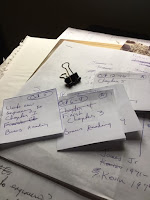By the end of this week (and this month that I had set aside for this manuscript), I will have finished one chapter that I'd already started and completed two more. I've also reorganized the first part of the story structurally, including a new first chapter. More importantly, I think, I am into the world of the book again, a world I hadn't entered since, maybe, last spring.
Still Shorter Periods Of Time
In Boundless Creativity: A Spiritual Workbook for Overcoming Self-doubt, Emotional Traps, and Other Creative Blocks by Martha Alderson writes about assigning writing objectives to a time frame. She also suggests actually creating something tangible for each objective that you can manipulate as you work or complete your tasks.
Reality
Being realistic, in my case, means:
- Not planning an enormous amount of work for each day. That's setting myself up for failure
- Not planning to work on weekends. I rarely do any real, manuscript type work on weekends, anyway, and by leaving them free, I can have some time to revise these daily objectives, if and when I have to. To be really real, I haven't been able to spend the time I wanted to on weekends formally revising those objectives. I've sort of winged it whenever I could. But I've been okay with that, because, hey, I can live with chaos!
Speaking Of Small Amounts Of Work
My May Days group, which organized this October set-aside time, shoots for writing two pages a day. I don't care about that much, so long as I'm working. But I have found this past month that I'll be working and think, Getting to the two page point won't be that much work, Gail. Keep going.
No, two pages isn't very much. But that's my point. Small, realistic objectives can keep you (or, at least, me) working toward a goal. They make chaos manageable for a little while.



No comments:
Post a Comment